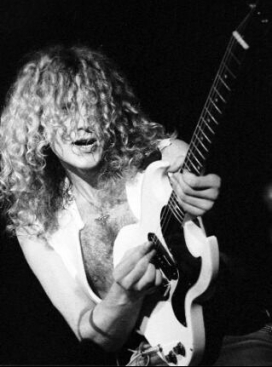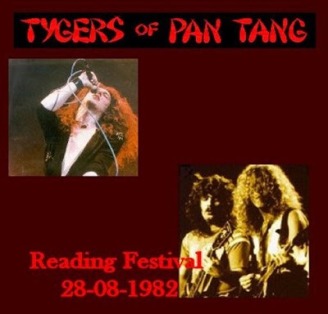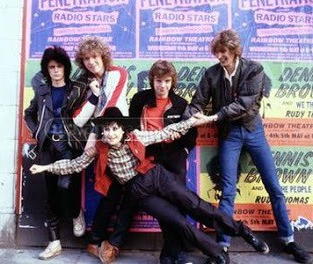
pic by Rik Walton
Fred has just released new album Square One with former Tygers vocalist Jon Deverill.
Fred was guitarist in North East bands Penetration and Tygers of Pan Tang, and I was a long haired 16 year old when I saw the Tygers at a packed out Newcastle Mayfair in 1982….
I remember with affection the gig at The Mayfair. The likes of AC/DC had played there and in the same dressing rooms, same stage, here we were! It was fantastic and with a local audience that was icing on the cake really.
The Cage tour was in support of the fourth album from The Tygers, and it took them in a different direction….
I was involved in writing a few songs from that album. After a lot of touring and writing there was a lot of pressure on the band and with the new writing going towards an AOR, polished kind of sound.
Our producer Pete Collins was trying new sounds to bring into rock that hadn’t been done before like Simmons drums.
It was strange hearing these synthetic and polished sounds in the recordings. Def Leppard used them all over their next albums. We could have paralleled their success if we didn’t have problems with our record label.
We were riding high, the atmosphere in the band was great we were getting on really well but the guy who signed the Tygers was moved up a notch in the record company so he had other priorities.
We didn’t get the commitment that we were hoping for from MCA, and as Def Leppard and Iron Maiden were getting huge support we weren’t.
We had released the cover Love Potion No.9 it had done really well and someone in the record company thought it would be a good idea to adopt the same approach for the next songs.
‘Play Motown covers with a rock sound’. But we didn’t really want to do that, so we entered into an impasse situation with MCA.

I had come up with some other material with Jon’s (Deverill) voice in mind and they liked it but there was still this situation between us, and it kind of all just slowly fell apart. We had a heavy weight around our necks.
Things were slowly getting worse. They were ok with the demos but MCA knew they would have a huge bill for recording, so it was getting harder and harder to get this thing out.
Subsequently I got more involved with the studio and started doing session work. Jon took the Tygers on further with songwriter Steve Thomson, and he did a few more albums after that. We’ve always stayed friends over the years.
He lives in London and I’m here in the North East so if he was on tour or I was down there we’d met up for a drink and a curry. Phone calls back and forth you know. But the project I was writing I always felt it had something because it had such positive feedback.
What did Jon Deverill do after the Tygers ?
‘He’d always liked stage work, so he went to an acting school in Wales, learned his craft and qualified from there. He’s forged a career out of it because acting is a really difficult thing to get into. Theatre is his preferred thing.
The album that you and Jon have just released ‘Square One’ was all of that wrote at the time of leaving the Tygers ?
Not all of it, I had about four songs and since then at various times have developed them and added more through writing sessions and recorded the vocals when Jon was available.
Life got in the way over the years so it was a case of attending to it when I could. Engineering and recording work took over and performer, producer, had to take second place.
To revisit it was a nightmare because technology has moved on. From analogue, tape alignment, just digging out those tapes presented technical problems.
Using pro-tools had its advantages seeing the problems right there, and not using razor blades to cut the tape anymore (laughs).
What was the feeling first time listening back to those songs, was it a pleasant surprise ?
With anything you do you would do it different, some of them were from 30 years ago. You always reappraise things you know ‘Could have had more of this or less of that’.
I probably over scrutinised some of it and been a bit finickity about it, but I enjoyed working on them.
Having an external producer is a good idea because they can hear things in it which you might not. They would say yes that’s the one with its happy accidents in it rather than the straight jacketed version I was going to use.
How did you get into studio work ?
I was just fascinated with the whole process. When I was in Penetration we would go in a studio and it was wow, really impressed by it, and I just asked loads of questions.
For session work I was working at studios in London like Snakeranch, Marquee, Phonogram I would ask the guys what’s this, how does this work and they would tell me, encourage me and said I had good ears. They’d say ‘Why not consider doing this, because you can’.
This was to their advantage because I would come down to do some backing vocals, keyboards or guitars for a mainstream act and I could also engineer it. They could then get on the phone for that next production job for Roxy Music or somebody (laughs).
What type of session work did you do ?
People like Elaine Page, Tracey Ullman, even Alvin Stardust are the one’s I remember that had mainstream success. I had done some stuff with Peter Collins (Tygers producer) and he was working with Gary Moore.
When it came to the time when your name was to be added to credit lists, I just wanted to add my name, but Peter said I wasn’t sure you would want that because Gary Moore doesn’t like to be credited, he thinks it’s uncool cos he’s a rock guy. I thought about it but went ahead with my name, I didn’t think it wasn’t cool (laughs).
How did you get interested in music ?
I was born in an industrial town and went to school where some of the teachers thought they were doing you a favour by knocking any type of wonder out of you.
Exactly opposite to the American ethos of you go for your dream. I ended up getting a place in Newcastle University to study architecture. I took a year out of that to work on a trading estate to get the money to buy a guitar.
I got out there and played with local bands. I grew up listening to Bowie, Mick Ronson, The Who and when the punk thing came along I loved the energy of it. I also wanted to improve on my technical side of playing guitar.

How did the Penetration job come about ?
Penetration came along after they were already signed to Virgin for a couple of singles and were looking to do an album deal. The record company wanted the band to have another guitarist/writer involved and as I’d already played with Gary Smallman the drummer, he recommended me to the band.
When I met them, they had a real chemistry, the atmosphere was good, so I gave it a go and we played The Marquee. It was really exciting, loved it and Virgin signed us that night on an album deal.
The architecture thing was still there and the sensible voices were saying architecture means a steady job but the music biz ooh no (laughs). But I was young and didn’t want to arrive at 45 look back and say what if you know.
I joined Penetration in ’78 and was with them until the end of ’79.
Do any moments stand out when you were in Penetration ?
Yes we were on tour in the USA and I turned 21 in Boston. It was a blast. Great fun.
We were out there on the same tour that The Police had done, they had done the circuit twice and they broke. Squeeze had done it, they broke. But after the first circuit of that tour we were over worked, burnt out.
Virgin were a great label but turn over for albums was quicker in those days and they wanted another one quickly. Just too much. Sadly we split.
In hindsight if we had just had a holiday maybe taken four weeks off and come back refreshed, that would of worked.
When Penetration toured the States you weren’t travelling in luxury then….
(laughs) No the perception is that it can be a glittering world, we didn’t complain about it then because it was a great opportunity. But looking back it was very tiring travelling hundreds of miles every day sitting on your backside for 8-9 hours in the back of a van.
When I was young I used to read the Sounds and read the back of albums things like that and think it would be very glamourous. But the reality is it can be quite mundane.
When I joined Penetration we were getting £25 a week. Before we played The Marquee we got a telegram from Ian Drury to wish us luck. But he was only on £25 a week when Hit Me with Your Rhythm Stick was number one in the charts!
Obviously that money would filter in later on, but the record company put a lot of money into the band and until you reach that break even line your just on the recoupment phase.
They want their loan repaid before you see any money. So, they would pay you per diems of say £10 per day so you can get food and essentials.
There would be bands in great recording studios impressed by it all, rightly so, but in the background is the ching, ching sound of the money register. They are accruing a debt to the record company, and they want it back.
Did you have management at the time ?
With Penetration we had Rory Gallagher and Status Quo management. We had a young energetic manager called John Arnisson who went on to manage Marillion and I think now he manages Billy Ocean.
The Tygers had Graham Thomson as tour manager and day to day and other more important stuff was handled by Tom Noble, still a friend of mine. He also manages Jon and I for the Square One project.
Have you met people who you looked up to as musical heroes ?
Yes in Penetration when we were touring USA the tour manager was a guy called Stan Tippins and he tour managed Mott the Hoople.
When we played New York Ian Hunter came along to see the band. I had problems with tuning on my Gibson SG. All night it had been drifting out of tune and he came backstage.
Well here he was, I grew up listening to All the Young Dudes and he was such a nice guy… ‘I know how you can fix that ‘ he said as he worked on my guitar with a graphite pencil. I was gobsmacked. There it was, Ian Hunter sorted out my G string tuning on my Gibson SG (laughs).
Then you had Mick Ralphs hanging around, we were backstage in the Whiskey in L.A. with Joan Jett. Unfortunately never met Mick Ronson who was the guy who got me wanting to play the guitar. We also did a French tour supporting Rory Gallagher which was a real education.
When I was in the Tygers I met all the Maiden people, Lemmy, all the guys in the rock bands that were around those days. Your peers really.
Not a hero of mine but seemed a canny lad when I met him was Roy Wood. I was in the lift of Hammer House and he got in. He had all the hair and the beard (laughs) Just a short guy with a Brummy accent. This was ‘78 after the Christmas song and all that, this felt like another world.
Any plans on taking Square One out live ?
If this album does anything really exceptional, I’d love that to happen but I’m realistic enough in today’s climate that I would be happy enough for people just to hear it.
Should it get enough interest to make it financially viable it might be there as a possibility. Thing is you want to put out your best and people deserve to hear it fully and at the best quality.
Purser/Deverill album ‘Square One’ with Jeff Armstrong (drums) Jon Deverill (vocals) and Fred Purser (keyboards/guitars) out now on Mighty Music.
Contact the band at
https://www.facebook.com/sparechaynge/
Interview by Gary Alikivi December 2018.


A photo credit would be good Gary!
LikeLike
Yep no problem which pic Rik ?
LikeLike
The one at the top of the article
LikeLiked by 1 person
ok that’s in….cheers.
LikeLike
Thanks Gary! Fascinating interview btw!
LikeLiked by 1 person
thanks Rik what about a feature on the blog about your work ?
LikeLike